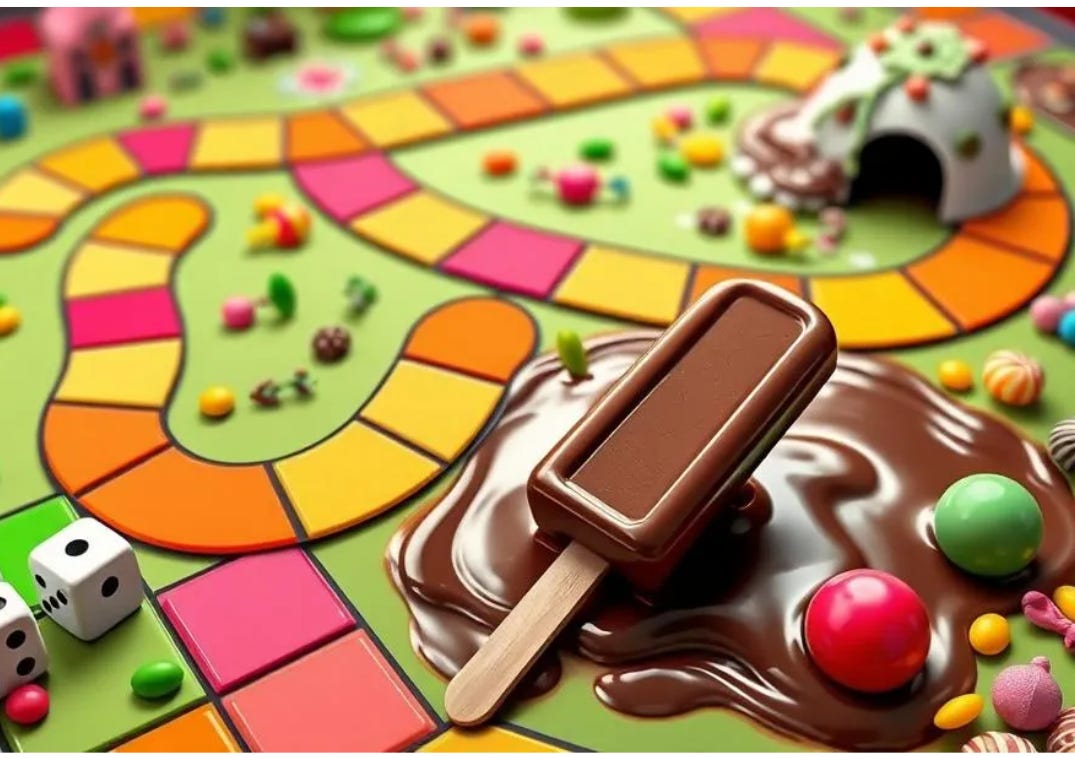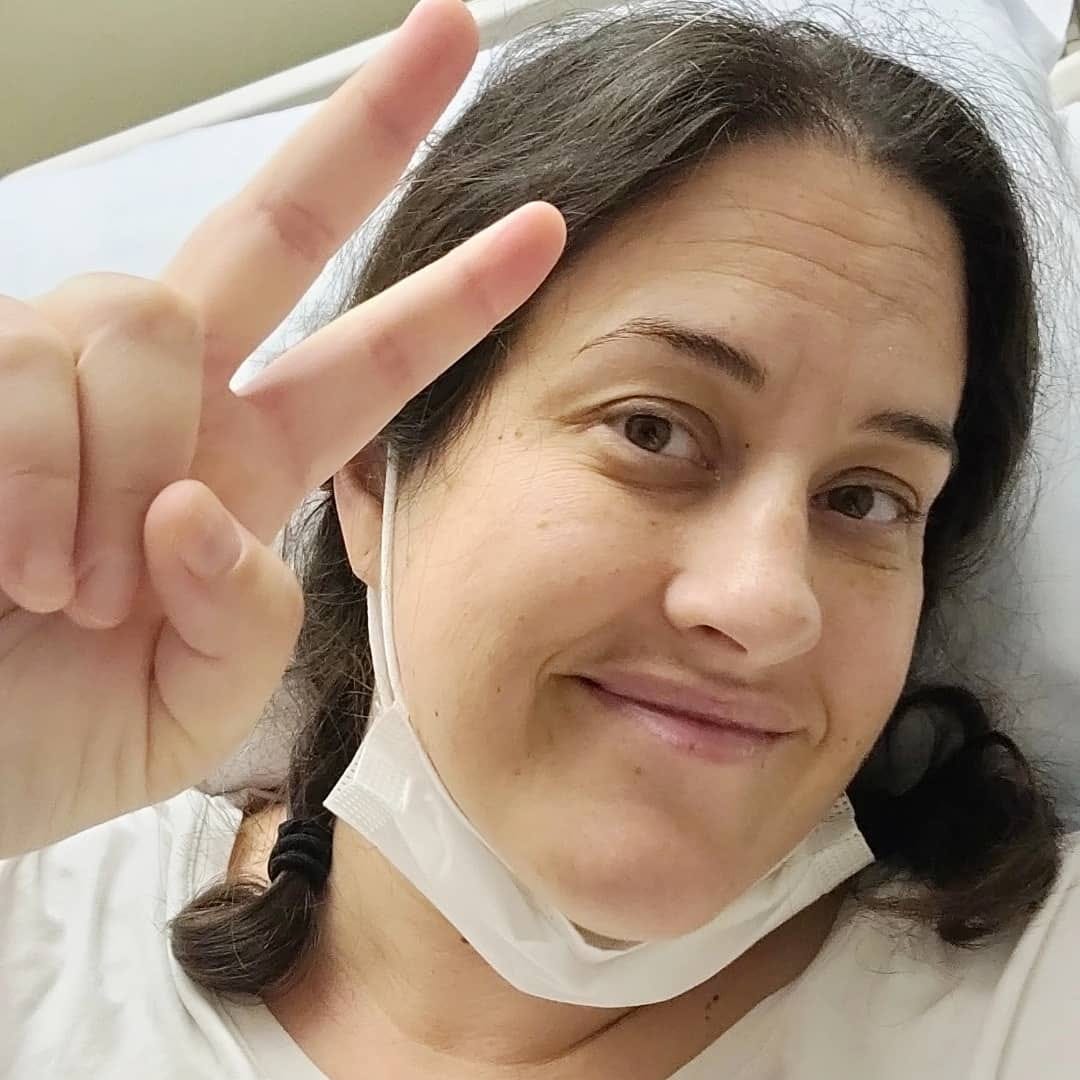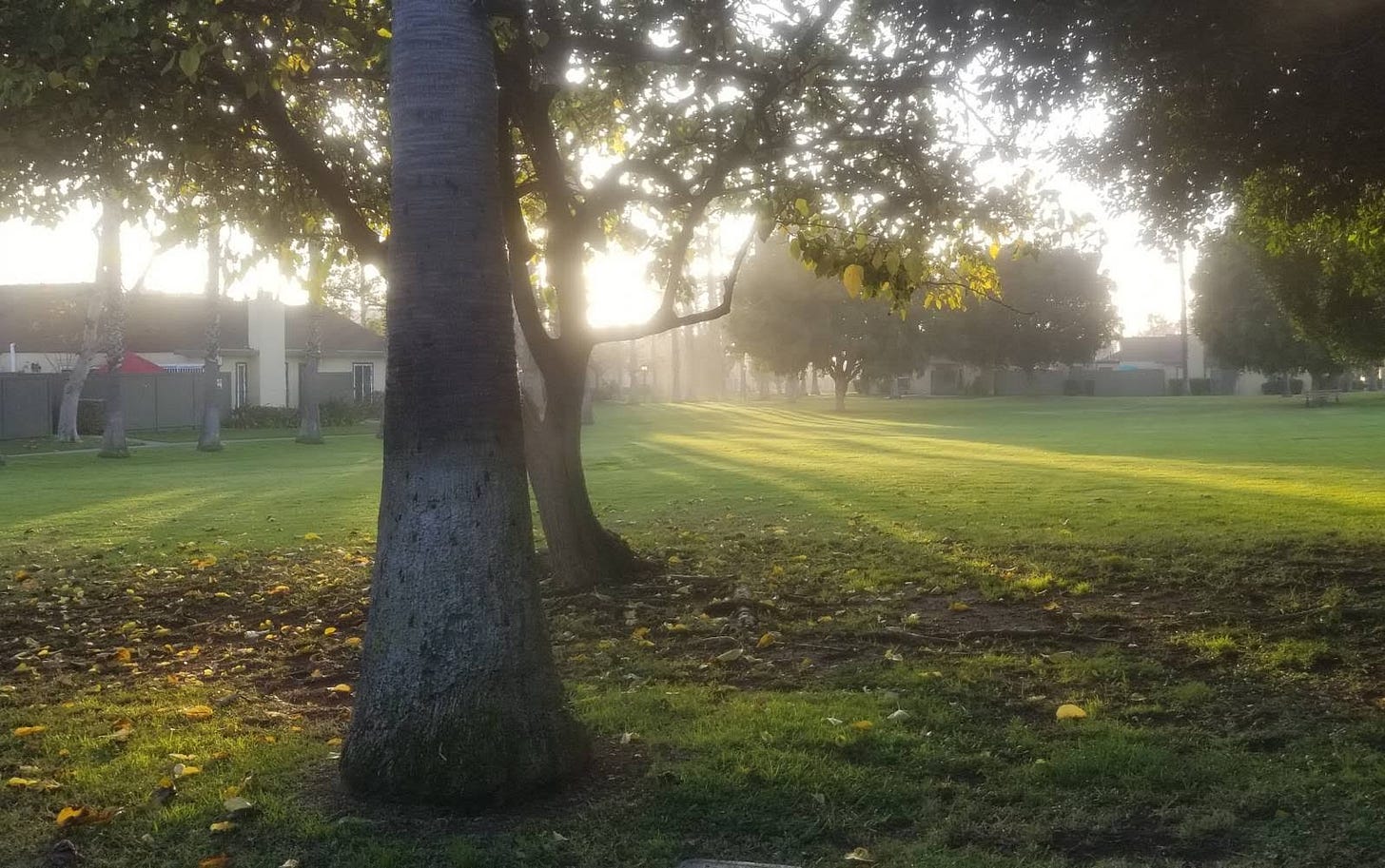Yesterday I discovered that the word, nostalgia, originates from the combination of the Greek words for homecoming and pain. Now it holds a wide meaning that encompasses wistful longing, regret, sentimental affection, reminiscing and remorse.
Have you ever played Candyland and missed a turn with Gloppy in Molasses/Chocolate Swamp?1 The problem isn’t the molasses or chocolate. They’re wonderful and tasty! It is traversing through the swamp that is the challenge. Getting stuck sets the player up to lose the game. Nostalgia is a lot like this—including nostalgia for painful life seasons.
Unpleasant dreams
There is a door banging shut and something clattering. Now I can hear the nurses' chatter. A cart rumbles down the hall. Is it an ultrasound machine, or an x-ray? I am acutely aware that someone is about to open the door—or they already have—to pull me from my dreams.
I feel desperate. I need sleep. I won't get better without it. And I want to escape from this reality and the pain of it within slumber's embrace. My subconscious is trying to scream at them, "Please don't wake me up!"
Why are they surprised? They're the ones telling me to get some rest or take a nap, but I don't think they really mean it. They sure don't equip me to sleep. They aren't helping out. If anything, I feel like they still expect me to be like them, with normal hours.
I should probably wake up, but I feel so tired...maybe if I drink some coffee...
I also know that when they come I have to be on. Somehow I have to shake myself present so I can make big life-and-death decisions. But I can't think clearly; I'm half unconscious! How am I supposed to comprehend what they'll ask me? Or what they will want me to understand? It just feels so unfair.
There is too much to be aware of. What if my baby's heart-beat drops out again? He might die inside me because I’m sleeping. Or what about the time that draw was botched? I woke up sticky and covered in blood. And sometimes the nurses don't get my medicine until too late, but I'm already in so much pain. I must be preemptive for my own sake.
But please, let me sleep just a few minutes longer...
Aren't I In the Hospital?
This week, in the early morning hours and the hardest part of every night, I became cognizant of a regularly occurring experience I have. In that in-and-out of consciousness space, I was aware that I was in the hospital.
But of course I am not.
Sleeplessness: a common problem
I have trouble sleeping. This isn't uncommon. I know many of you do, too, even if for different reasons. You too might have had seasons of insomnia and seasons of babies waking up through the night. Then, seasons of trauma or grief. Or a sick body.
In a combination of all of these, three years ago my sleeplessness was at its worst. My sleep was riddled with nightmares, flashbacks, hyper-vigilance, waking up to care for my body, and a preemie to change and feed.
I put healing on a timeline. I keep thinking this should be “fixed” by now.
Although getting better physically and mentally has helped a lot, and now the baby is a small kid, my sleep still isn't great. Last month I had a breakdown, I was just sooo tired and I just couldn't deal with poor sleep anymore.
That’s why this month we are working on mine and my son's sleep hygiene.
My therapists have had me trying various things over the last couple years. Although prayer and grounding techniques can help, sleep has still been a struggle. We've made a few connections too—after all, the traumatic things that have occurred in my sick-bed have piled up pretty high. It's a "body keeps the score" thing, where my nervous-system has to be retrained.
This isn’t just some simple nostalgia, but to my surprise, nostalgia plays a role.
Very important sleep mantras:
I will be okay if I don't get enough sleep.
My son will be okay if I sleep.
Memories vs. trauma
Of course, once I realized some part of my lightly-sleeping subconscious believes I am in the hospital most nights, I wanted to unpack it with my therapist. What the heck is going on in my mind? Why do I think this? In that weird way that talk therapy (and inner healing prayer) works for people like me, we stumbled onto some beliefs I have that might not be exactly true (but I believe them anyway). We also ended up somewhere totally different than where either of us expected we would—on martyrdom—but I am not going to get into all of this here.
Sure, I have more than my fair share of traumatic hospital memories. But a lot of what I experienced in the in-between wasn’t really terrible. It was normal, with spots of joy and a lot of neutral daily life. Yes, maybe some of this hum-drum is attached to some false beliefs, but many memories themselves aren’t actually bad.
I've noticed I have a very hard time allowing myself to be sad with things that aren't necessarily traumatic. Can there be grief about this everyday life, too?
Nostalgia
I’ve been gifted with more time. I’m so aware of my current everyday moments brimming with hopeful and exhausting life that I don’t want to take for granted.
I take my meds in the morning and then schedule a never-ending roll of appointments to take care of everyone's needs. I hike to overlooks as I pray for "spacious land." My everyday looks like writing an essay, coaching a creative, or consulting a budding nonprofit. Later, I do school pick ups and drive my kids around to their stuff. I play with my toddler in the “pooh” (neighborhood jacuzzi) and admire the sunset from under the palm trees. My everyday is calling loved ones and getting to know my community over a meal. It is laughing with whichever kids are snacking in our messy kitchen as we joke around. It is putting band-aids on my adventurous skateboarder, listening to my audiobook as I run errands, and cuddling with my husband as we fall asleep at night.
The everyday: these are the beautiful moments of life where we find joy, heartache, and meaning. We’re might not be great at grief as a culture in America, but we at least have somewhat of a framework for this sadness about that past, even if it often isn’t acknowledged until we hit a bigger marker: a move, becoming empty-nesters, a family-member's death. Overall, though, we’re prone to minimizing nostalgia. But nostalgia is a valid and important type of grief.
Christmas ornament
At the end of 2020, like many others, I purchased a variation of “The Year We Stayed Home” Christmas ornament, naming a lot of the everyday moments of that really hard year. Unintentionally it became a strange memorial to honor a season of time that we each relate to. Although that year (and the next) held significant trauma for many of us, it also contained everyday experiences that glued it together—how we coped, how we built resilience, and how we connected to carry us through.
We don’t just experience grief at the epicenter of significant loss, change, and trauma. We need the space to name and grieve the aspects of life that hold these difficult seasons together. Like everyday moments of living in-and-out of a hospital.
How to process a holding-you-together-season
The sleep issue and related panicky-anxiety aside, it blew my mind at how little I've acknowledged these everyday moments in my season of sickness. In so many ways they all blend and blur together, just like the everyday moments of my life do now.
But mostly, it is hard to know how to traverse this. Every night I feel stuck in the Molasses/Chocolate Swamp.
My go-to’s—writing, praying, and therapy—don’t work well with the reminiscent quality of this hard season of life. I can describe hundreds of scenes of daily life as a patient. But it’s too beige to make much of a story. We’re hooked by the interesting, the trauma, which provides scaffolding for a narrative to build. Even I’m bored by the chronicles of hospital days, even though I apparently I vividly relive them in my dreams.
Tonight I had an idea. Instead of describing monotony, in which my mind always starts to drift to the bad parts, I decided I’d make a gratitude list. Maybe this would honor this everyday season. After all, worshipful thankfulness was how I coped, built resilience, and connected with God and others in this tough season. Maybe it can help me now, too, as I try to get unstuck.
Gratitude List for Everyday Hospital Life
This being said, here are forty things I am thankful for from my memories of life in the hospital:
Phlebotomists who did an excellent job with blood draws.
The invention of the pee-sucking-up PureWick.
Doctors who’d discuss with me what was going on with my body or just stop by to check in (even when it woke me up)—this sure beat the ones that were uncommunicative.
Opioid drugs I desperately needed for pain even though I hated the way they made me feel: codeine, hoxycodone, oxycodone, and morphine.
The cool factor of seeing my own heart or my son’s beating on ultrasound machines (depending on whose they were checking out).
The nurses who were kind, compassionate, and did their jobs well.
For the particular God-focusing music downloaded on my phone for the many days I couldn’t write with my shaking hands, see with my blurry vision, or talk without coughing.
The absolutely delicious tomato-and-ham omelet with bacon that for awhile I was allowed to have for breakfast.
Anestheithologists who paid attention: making sure I didn't wake up, didn’t feel surgeries, and comforted me when I was distress.
That they decided not to intubate me.
When my husband was allowed to come in with me and I wasn’t alone.
The huge hopeful stork that stands over Mary Birch Hospital.
The creativity of colorful hospital socks that communicate fall status (and the friend who gave me thick nicer nonslip Harry Potter socks that circumvented the system).
The days a specialist, lidocaine, and a sonogram machine were available for IV insertion (and the and the too-small handful of exceptionally kind and persevering nurses on the many more days they weren’t).
When the IVs and medicines didn’t sting.
The nurses who’d monitor my baby, diligently look for a heartbeat, give me pep talks, and were able to get doctors in there within minutes of any signs of distress.
My often used emergency bag, stocked with the essentials: a good pillow, a six-foot phone cord & charger, tissues, a water bottle, a bag of mixed nuts, extra underwear, headphones, light sweatshirt, hair ties, face mask, and my ID cards.
Transport techs who could powerfully wheelchair me through complex back hallways, getting me to each unique specialty department, test, or surgery.
Interesting conversations I’d have with hospital staff: The guy who only used horoscopes to find a life mate (it wasn’t working well), the doctor who was figuring out how to be a parent, the phlebotomist who told me her crazy immigration story, and mom nurse whose daughters ended up nursing in different levels of the same woman’s hospital.
That I was always able to take off my mask eventually because my COVID tests were always negative.
Being forced to get up and try to walk again and again and again.
The doctor who relaxed enough to sign away a hospital dietary plan so I wasn’t on the diabetes, heart, and renal diets all at the same time (which pretty much left nothing to eat).
I didn’t have to watch horrible T.V. and commercials because there was a decent movie selection—I watched some interesting movies I would have never otherwise seen.
The staff insistence to keep another incentive spirometers on the already crowded bedside table, no matter how often they’d fall off or that I already have ten at home.
Friends and neighbors who’d bring me to or pick me up from the hospital complex.
When I had a nice view or greenery outside the window of my room.
All the ingenious ways set up to help me get up to use the bathroom—always a big deal and major part of daily life: from support staff, to methods to measure pee, to commodes, to fresheners, to wipes, to handles, to towels to sit on, etc…
Resources from social workers, physical therapists, and dietitians, helping me learn, which reminded me that I was still capable.
That I could watch my son in a webcam.
That NICU nurses made sure my baby was held and cared for when I was too sick to show up.
Security guards who’d push my wheelchair, say a kind word, and remembered where I belonged.
When the ER had eye-masks and earplugs in stock.
For the cool meal-ordering app (sadly, only available in the Women’s hospital), which made that hospital food enjoyable.
The gangly cold plastic wheelchairs that could also serve as walkers and the hot blankets they’d drape on them for me.
The breastfeeding consultants who'd do the run around between my doctors, the pharmacists, and the NICU to ensure that the couple drops of "golden" colostrum were administered—I'm also thankful that they gave me permission to heal, reminding me over and over that "fed, not breast, is actually what is best."
Doctors and random acquaintances who gave me all their samples of formula and frozen breast milk to carry us through the shocking formula shortage.
For the “dates” when a nurse would bring us ice cream and my husband would squeeze in the bed beside me to watch a movie until I was too tired.
The gentle nurse who sat at my side through the 24 hours I disappeared under the magnesium drip.
For the doctors who said they were sorry I wasn’t taken seriously.
The coffee cart that had delicious lavender lattes I was occasionally able to enjoy.
Honoring Nostalgia
These memories may not be remarkable in the traditional sense, but they are real, and they mattered because they represent the days that held me together. Gratitude doesn’t erase the pain of grief, but it gives shape to the in-between spaces of a meaningful and beautiful life.
I hope that by sharing about my experience you feel encouraged to honor your own everyday memories and understand that nostalgia—even for the hard seasons—has a purpose. And maybe, as we practicing gratitude for what was, we’ll be able to traverse beyond the molasses of memory and into the next colorful space we’re given.
If this post was helpful, please tap the heart 🖤 icon, leave a comment, or reply to this email sharing something that stood out to you. Your engagement encourages me greatly. And when you engage here and/or share this, it helps these words reach others waiting for them.
Thank you.
You can find past posts visiting AuthenticallyElisa.substack.com
Follow me on Instagram here @AuthenticallyElisa
See what’s new on my Patheos column: Flourishing Faith and Justice
Personally, I always thought it was chocolate anyway. Apparently, this switch makes some people on the interwebs nostalgic for the OG Candyland. There are some serious people out there—They’ve built an actual Candyland Wikifandom website!







